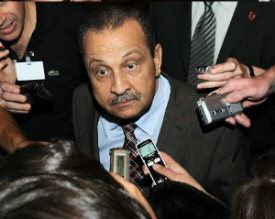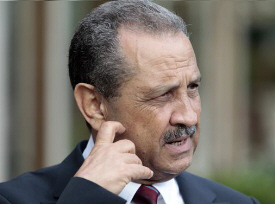Shukri Ghanem, a former Libyan prime minister and oil minister, has been found dead Sunday in a section of the Danube River flowing through Vienna, Austrian police say.
 Shukri Ghanem, a former Libyan prime minister and oil minister, has been found dead Sunday in a section of the Danube River flowing through Vienna, Austrian police say, news agencies reported.
Shukri Ghanem, a former Libyan prime minister and oil minister, has been found dead Sunday in a section of the Danube River flowing through Vienna, Austrian police say, news agencies reported.
Police spokesman Roman Hahslinger said the 69-year-old's corpse was found floating in the river early in the morning Sunday. The body showed no external signs of violence, but the cause of death was not immediately clear and an autopsy will be carried out, Hahslinger said.
"There would be no signs of violence if someone pushed him in," Hahslinger said. "But it's also possible that he became ill and fell into the water."
An Austrian foreign ministry official said family members initially told the ministry that Ghanem had died of a heart attack, adding that their version appeared to be plausible. He demanded anonymity because his ministry was not in charge of investigations.
 Hahslinger added that officials are waiting on autopsy results to determine the true cause of death.
Hahslinger added that officials are waiting on autopsy results to determine the true cause of death.
Ghanem was dressed normally when found in the river but had no personal identification on him other than a document that named the company he was working for, Hahslinger said.
An employee of the company was subsequently contacted and identified him, the police spokesman said.
Hahslinger said Ghanem apparently left his residence early Sunday morning after spending Saturday evening at home with an acquaintance. Police were alerted by a passerby who saw his body floating near his Vienna residence, close to the modernistic building housing UN agencies in the Austrian capital.
Ghanem is a former Libyan prime minister who last served as his country's oil minister until 2011. He left Libya for Tunisia and then Europe in June as insurgents were pushing to topple Gadhafi, and he subsequently announced he would support the rebels.
Ghanem was said to be autocratic at home, but reporters covering the Organization of the Petroleum Exporting Countries remembered him as a friendly man who readily gave his cellphone number to selected journalists covering OPEC ministerial meetings and gracefully took even late-evening calls, CBC news reported.